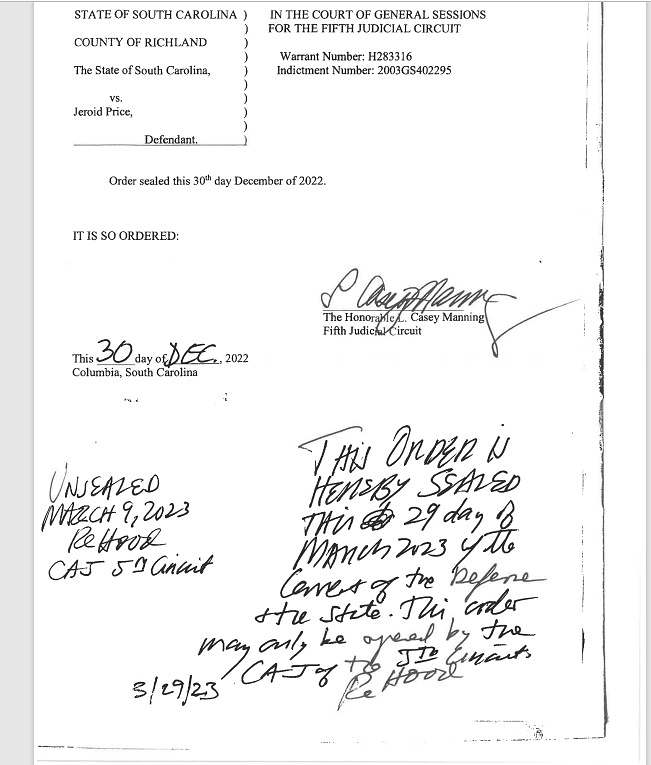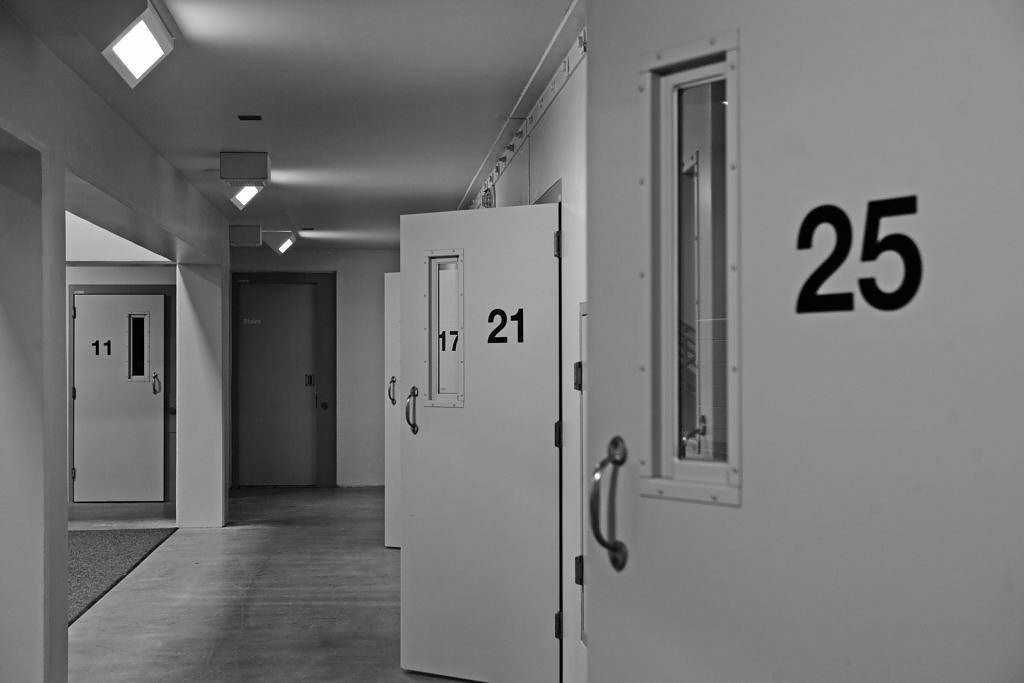|
Getting your Trinity Audio player ready...
|
The South Carolina supreme court recently detailed its split decision from April of this year vacating the extra-legal release of killer/ gang leader Jeroid J. Price from prison. At the time the original ruling in this case was issued, Price was a fugitive from justice – having been set free by an illegal, unconstitutional order. By the time justices published the reasoning behind their ruling, he was back in custody.
Fundamental to the court’s findings: The lower court did not have the authority to reduce Price’s sentence, close his criminal proceedings or seal from public view the order which accomplished both of those things.
A street leader of the Bloods gang, Price shot and killed 22-year-old Carl Smalls of Charleston on December 7, 2002. He was arrested several weeks later and convicted of murder by a Richland County jury in December 2003. His 35-year prison sentence – handed down by former S.C. circuit court judge Reggie Lloyd – was “day for day,” meaning Price was supposed to remain behind bars until early 2038, consistent with South Carolina’s mandatory minimum law for murder convictions.
Nonetheless, Price was released from a New Mexico prison on March 15, 2023. He was being held there as part of an interstate compact with the S.C. Department of Corrections (SCDC) after serving nineteen years of his sentence. Price’s early release was one of the final acts of now-retired S.C. circuit court judge Casey Manning on December 30, 2022.

***
Manning’s decision to release Price was in violation of both the state’s mandatory minimum law – S.C. Code § 16-3-20 (A) – and the victims’ bill of rights provision of the S.C. Constitution (Article I, Section 24).
What led to Price’s early release?
In February of 2022, Price’s attorney, powerful lawyer-legislator Todd Rutherford, contacted S.C. fifth circuit solicitor Byron Gipson about reducing Price’s sentence. In mid-December, Rutherford and Gipson exchanged emails with drafts of an order. Late in December, Rutherford and Gipson met privately in Manning’s chambers. This meeting was not documented in the public index – and the victim’s family was not notified.
On December 30, 2022, Manning signed an order reducing Price’s sentence based on his “cooperation” with correctional agents as described in an addendum to the order. The order was subsequently sealed by Manning. These documents were not file-stamped – and there is no indication they were ever filed with the clerk of court.
And again, Price’s victims were not notified as required by law.
According to the supreme court opinion, it is not known how SCDC obtained the order. However, Rutherford contends another circuit court judge sent the order to SCDC – which signaled Price’s release. The sealed order was then unsealed by another circuit court judge on March 9, 2023 – and resealed two weeks later. Again, none of these events were documented in the public index. Nor were victims notified as required by law.
Although the circuit court judge who sealed the file was unnamed, a handwritten notation indicated it was resealed by Robert Hood.
(Click to view)
Price was released on March 15, 2023. On that date, only Rutherford, Gipson, Manning and Hood (the unnamed circuit court judge) knew of the existence of the sealed order.
Price’s release was exclusively reported by this media outlet on April 17, 2023. The following day, S.C. attorney general Alan Wilson filed a petition with the court to begin the process of unwinding the illegal early release order.
The court points to four questions that were raised as they formed their decision:
- Did the circuit court have the authority to reduce Price’s prison sentence when the solicitor never filed a written motion seeking that reduction and neither the solicitor nor the circuit court otherwise complied with the requirements for doing so?
- Did the circuit court have the authority under law to close the proceedings to the public or seal the order reducing his sentence?
- Do the state’s and the circuit court’s violations of the Victims Bill of Rights and the Victims’ Rights Act warrant vacating the order?
- Did the circuit court have the authority to reduce Price’s sentence below the legislatively mandated minimum sentence?
After answering “no” to the first two questions, the court granted the relief requested by the attorney general. The controversial order was unsealed – and Price was ordered back to prison. In its latest ruling, though, the court concluded Manning acted outside his authority and committed an “error of law.”
Curiously, the court cited a 2009 case – Laffitte v. Bridgestone Corp – as its precedent. This is the case in which convicted fraudster Russell Laffitte served as the personal representative for sisters Alania Plyler-Spohn and Hannah Plyler – the latter of whom he defrauded for the purpose of providing loans to convicted killer Alex Murdaugh.
In 2010, the S.C. General Assembly passed legislation giving circuit courts the authority to reduce an inmate’s sentence under limited circumstances. The process requires a motion from the solicitor, copied to the chief judge of the circuit, and a public hearing conducted by the chief judge. Further, the law requires the reduction to be recorded.
Manning skipped nearly all of those steps, and thus “committed multiple errors of law and acted outside his authority,” according to the majority ruling by the court.
“We are greatly troubled by the fact that neither solicitor Gipson nor judge Manning made any effort to comply with even one of the requirements (of the law),” the justices added.
Further, the court stated there was a constitutional requirement for courts to be open to the public and the press and that court records cannot be sealed “unless there is a specific provision of law permitting it.”
***
RELATED | CRIMINAL INVESTIGATION NEEDED AFTER MURDERER’S EARLY RELEASE
***
“The courtroom may be closed only if specific findings are made that (1) there is a substantial probability that the defendant’s right to a fair trial will be prejudiced by publicity, (2) there is a substantial probability that closure would prevent that prejudice, and (3) reasonable alternatives to closure could not adequately protect the defendant’s rights,” they wrote.
According to the justices, Manning made no attempt to determine whether the law permitted any portion of the proceedings to be closed to the public.
“As to judge Manning’s attempt to seal the (order), we begin by making clear that even if there were lawful authority to seal a portion of the record here, and even if there were a sufficient factual basis to support sealing a portion of the record here, the order itself should never have been sealed,” they wrote.
The order granting Price’s early release spoke of the inmate offering assistance to a guard under attack and offering corrections officials information about an escaped inmate. However, it said nothing of the allegations that Price – as a high-ranking gang member – ordered a hit on the wardens of two SCDC facilities. SLED investigated these allegations in 2016 – and as part of their investigation administered a polygraph exam to Price.
He failed that exam.
The allegations against Price led to his eventual transfer to New Mexico under an interstate compact agreement in March 2017 – and again in November 2020. Prior to that out of state transfer, Price was moved often from one facility to another as detailed in his inmate report.
Price was apprehended in New York on July 12, 2023 and returned to South Carolina to finish serving his 35-year sentence with the SCDC. Pointing to the flaws in the 3-2 decision, dissenters concluded that while there were procedural deficiencies – specifically related to the lack of a hearing and the improper sealing of the order – the attorney general’s authority ended with Price’s 2006 prosecution and even if such authority existed it is not the purpose of the court to rescue the state from its own failures.
***
THE RULING …
(Via: S.C. Supreme Court)
***
ABOUT THE AUTHOR…
Callie Lyons is a relentless investigative journalist, researcher, and author known for exposing hard truths with heart and precision. As a journalist for FITSNews, she dives into high-profile and murky cases—like that of Mica Francis Miller— with fearless resolve and a sharp eye for detail, whether it’s tracking white-collar crime, uncovering religious abuse, or examining the often-bizarre behavior of those who believe they’re above the law.
Callie made waves with her groundbreaking 2007 book Stain-Resistant, Nonstick, Waterproof and Lethal, the first to reveal the dangers of forever chemicals, a story that helped inspire the film Dark Waters and influenced global scientific dialogue. Her work has appeared in numerous documentaries, including Toxic Soup, National Geographic’s Parched: Toxic Waters, and more recently Citizen Sleuth, which examines the complexities of true crime podcasting.
Whether she’s navigating environmental disasters or the darker corners of society, Lyons operates with one guiding belief: “Truth never damages a cause that is just.”
***
WANNA SOUND OFF?
Got something you’d like to say in response to one of our articles? Or an issue you’d like to address proactively? We have an open microphone policy! Submit your letter to the editor (or guest column) via email HERE. Got a tip for a story? CLICK HERE. Got a technical question or a glitch to report? CLICK HERE.





6 comments
This opinion came out over two weeks ago. Old news. Try to keep up, FITS.
Is this all you have? But we have your MAC address. *smiles*
How about the press association sue to have the family court proceedings involving Timmons, Rallis et al unsealed. If the Supreme Court follows it own precedent the family court judge should be admonished and the case unsealed
A 74 year- old retiring judge with almost 30 years on the bench doesn’t have job security or a promotion on his mind when he does something like this. A judge of such seniority in this high-population circuit also would know the particular law in question – which has been around for 13 years- pretty damn well. So it’s not that he misunderstood or was unfamiliar with the law. This clandestine deal was done either because of a major, major personal friendship to Rutherford, or some other form of quid pro quo. Since FITS is over 2 weeks behind on this story, maybe they can sharpen their pencil and vault ahead to find out if it is the former or the latter.
Who cares. 2 weeks, 4 weeks, whatever. With that said, what are your real motives behind your attack?
I am not surprised that SC judges are getting caught committing criminal acts from the bench. Its like a Family Court judge who was thrown off the bench. She took jurisdiction when she had none over the SC FOIA. She declared the SC legislatures were wrong to NOT exempt the names of public employees from release under the Act. Thus, she made an Order that the names of public Dorchester 2 school employees shall not be released. There were corrupt attorneys involved with her. All are still facing the filing of criminal complaints against them for, among other things, criminal conspiracy. And yes, there is direct evidence.
Courts have stated unequivocally that the judicial title does not render its holder immune from responsibility even when the criminal act is committed behind the shield of judicial office.
To the law enforcement internet operatives who troll FITS: what say you? Still peeking in even on emails and social media messages?